Last Train To Nuremberg

My Lai, anniversario di un massacro
di Lorenzo Mazzoni
Il soldato americano che l’11 marzo in preda a un raptus ha ucciso sedici civili nel distretto di Panjwai nella provincia di Kandahar, nel sud dell’Afghanistan, mi ha riportato alla mente il massacro, il cui anniversario cade in questi giorni, commesso da altri soldati americani quarantaquattro anni fa in Vietnam.
Il 16 marzo del 1968 i ragazzi della compagnia Charlie, al comando del capitano Ernst Medina, entrarono dalla parte settentrionale del villaggio di My Lai, dove ora sorge un grandissimo, giovane albero, e dove, allora, giocavano i bambini.
Svuotarono i caricatori. Buttarono le bombe a mano nelle capanne. Violentarono le ragazzine in branco, da veri boy-scout, poi le trucidarono con le baionette.
I più pericolosi esponenti del villaggio: vecchi e donne, vennero raccolti in gruppi e falciati con le mitragliatrici. Lo stomaco... (continuer)
CCG Staff 26/3/2015 - 22:48
Marengo

Marengo
Chanson française – Marengo – Marco Valdo M.I. – 2015
ARLEQUIN AMOUREUX – 1
Opéra-récit historique en multiples épisodes, tiré du roman de Jiří Šotola « Kuře na Rožni » publié en langue allemande, sous le titre « VAGANTEN, PUPPEN UND SOLDATEN » – Verlag C.J. Bucher, Lucerne-Frankfurt – en 1972 et particulièrement de l'édition française de « LES JAMBES C'EST FAIT POUR CAVALER », traduction de Marcel Aymonin, publiée chez Flammarion à Paris en 1979.
Voici donc, Lucien l'âne mon ami, une nouvelle série de canzones qui s'en vont te raconter l'histoire d'un Arlequin amoureux, ci-devant fantassin de l'Empereur autrichien François. Enrôlé de force, déserteur par vocation, il passera sa vie à fuir, fuir et à se réfugier en songe dans les bras imaginaires de son Arlecchina. On verra bien à la fin comment tout cela finira. Oui, Monsieur Po, oui, Monsieur Li, Oui, Monsieur Chi, Oui, Monsieur... (continuer)
Chanson française – Marengo – Marco Valdo M.I. – 2015
ARLEQUIN AMOUREUX – 1
Opéra-récit historique en multiples épisodes, tiré du roman de Jiří Šotola « Kuře na Rožni » publié en langue allemande, sous le titre « VAGANTEN, PUPPEN UND SOLDATEN » – Verlag C.J. Bucher, Lucerne-Frankfurt – en 1972 et particulièrement de l'édition française de « LES JAMBES C'EST FAIT POUR CAVALER », traduction de Marcel Aymonin, publiée chez Flammarion à Paris en 1979.
Voici donc, Lucien l'âne mon ami, une nouvelle série de canzones qui s'en vont te raconter l'histoire d'un Arlequin amoureux, ci-devant fantassin de l'Empereur autrichien François. Enrôlé de force, déserteur par vocation, il passera sa vie à fuir, fuir et à se réfugier en songe dans les bras imaginaires de son Arlecchina. On verra bien à la fin comment tout cela finira. Oui, Monsieur Po, oui, Monsieur Li, Oui, Monsieur Chi, Oui, Monsieur... (continuer)
Au printemps de dix-huit cent
(continuer)
(continuer)
envoyé par Marco Valdo M.I. 26/3/2015 - 21:17
The Babies of My Lai
Norm Burns
Another song-poem about My Lai, released in Boston, Massachusetts - these are song lyrics, sent to specialist publishing and recoding companies, usually in response to an advertisement, that have been set to music for a fee (around $200-400). (1) Composed by Ann Parks and Lew Tobin (he co-founded the label with Shelley Stuart, and he presumably took the writing credit for the music side). Performed by Norm Burns & The Satelites. The track, called "The Babies of My Lai" (Sterling Records # S-547), probably released in either late 1971 or early 1972 (based on the label discography), focused on the death of the children at the massacre. The narrator sarcastically said that "a little baby raised it gun" and so a soldier "raised his weapon in defense". The narrator mourned the deaths: "sleep baby sleep", and declared to "never forget what has been done". The lyrics did not mention or comment on William Calley's trial, but it leaned towards criticising his actions, and therefore it fell into the anti-Calley camp.
Justin Brummer
Justin Brummer
Sleep baby sleep, sleep baby sleep
(continuer)
(continuer)
envoyé par dq82 26/3/2015 - 18:10
Parcours:
Guerre au Vietnam: vue des USA
Will There Ever Be a Time?
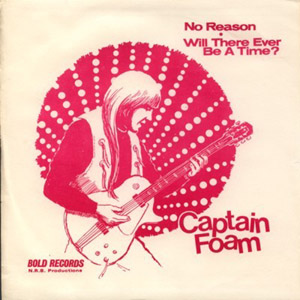
The song "Will There Ever Be a Time?" (Bold Records # 377 / 358), probably released around 1969-1971 by Captain Foam, an obscure psychedelic folk group, based in Ohio, took a general anti-war position, while referencing the My Lai massacre. Written and sung by Richard Bertram, produced by Nick Boldi, and engineered by Gary Rhamy, the song was recorded in Peppermint Productions Studios, in Youngstown, Ohio. (1) Firstly, it expressed opposition to war, counting the dead, and questioning why they had to "see them fall". The narrator accused presidents of "trying to play god". He then called for the "money that they spend to build the guns and bombs", to be redirected towards clearing the "world of hunger", which would contribute towards "peace and equality". Then onto the subject of Calley and the massacre, the narrator argued that the "guns of...My Lai" represented a "curse upon the world".... (continuer)
Will there ever be a time, a time so real...
(continuer)
(continuer)
envoyé par dq82 26/3/2015 - 18:07
Parcours:
Guerre au Vietnam: vue des USA
Were You There?
The country rock band Mason Proffit formed in 1968 in Indianapolis, Indiana, led by The Talbot Brothers - John Michael Talbot and Terry Talbot. While their two previous records made the charts, this one failed commercially. The song "Were You There" (Warner Bros. Records # BS 2657) contained socially conscience lyrics, running through several injustices throughout history - from slavery, to the Holocaust: "you cried when Hitler killed the Jews". It then moved to Vietnam, posing the question "were you there at My Lai?", and then entering into a plea for people to protest: "come all of you, it's time to take a stand".
You said something should be done
(continuer)
(continuer)
envoyé par dq82 26/3/2015 - 17:58
Parcours:
Guerre au Vietnam: vue des USA
Lieutenant (Had Any Lately)

(1971)
The soulful track "Lieutenant (Had Any Lately?)" (Stang Records # ST-5027), out of New Jersey, took an anti-war line and condemned Calley - one of the few to do so.
Is this record performed by Sylvia Robinson?
A year earlier she released the single Have You Had Any Lately (Stang # 5015) - the same melody and with almost identical lyrics, without the Calley references, written by Robinson.
(1) Robinson did in fact have three children.
(2) The song later appeared on the 1973 album Pillow Talk (Vibration Records # VI-126).
Anyhow, the structure of the verses, formed by repeating questions ('how long' and 'how many') took a similarly effective approach to Bob Dylan's "Blowin' in the Wind" - the narrator wanted to know "how many children did you kill" and "how much...of their blood did you spill". She declared that Calley's actions made him "inhuman" and "not fit for society".
Vietnam War: My Lai & Lt. William Calley Songs
The soulful track "Lieutenant (Had Any Lately?)" (Stang Records # ST-5027), out of New Jersey, took an anti-war line and condemned Calley - one of the few to do so.
Is this record performed by Sylvia Robinson?
A year earlier she released the single Have You Had Any Lately (Stang # 5015) - the same melody and with almost identical lyrics, without the Calley references, written by Robinson.
(1) Robinson did in fact have three children.
(2) The song later appeared on the 1973 album Pillow Talk (Vibration Records # VI-126).
Anyhow, the structure of the verses, formed by repeating questions ('how long' and 'how many') took a similarly effective approach to Bob Dylan's "Blowin' in the Wind" - the narrator wanted to know "how many children did you kill" and "how much...of their blood did you spill". She declared that Calley's actions made him "inhuman" and "not fit for society".
Vietnam War: My Lai & Lt. William Calley Songs
How long has it been lieutenant since you made a friend
(continuer)
(continuer)
envoyé par dq82 26/3/2015 - 17:51
Parcours:
Guerre au Vietnam: vue des USA
The Cry of My Lai
Ivan Lee
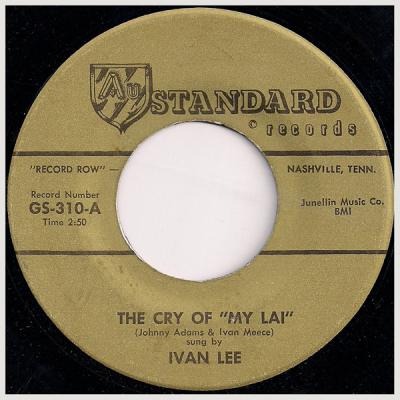
The Cry of "My Lai" / It Makes No Difference (1971) [Single]
The traditional country song "The Cry of My Lai" (Gold Standard Records # GS-310) - one of the few songs that condemns the massacre, with the narrator telling Calley that "the devil possesses your soul", against the background sound-effect of an infant crying. He asked: "hey lieutenant, can you still hear the small babies cry?". He also wondered if Calley had acted as if in a childhood game: "did the frightened child remind you of a smiling boy, who plays war at home and the gun is only a toy". Released in Nashville, Tennessee, written by Johnny Adams and Ivan Meece.
The traditional country song "The Cry of My Lai" (Gold Standard Records # GS-310) - one of the few songs that condemns the massacre, with the narrator telling Calley that "the devil possesses your soul", against the background sound-effect of an infant crying. He asked: "hey lieutenant, can you still hear the small babies cry?". He also wondered if Calley had acted as if in a childhood game: "did the frightened child remind you of a smiling boy, who plays war at home and the gun is only a toy". Released in Nashville, Tennessee, written by Johnny Adams and Ivan Meece.
There in a ditch in My Lai, a small baby cried
(continuer)
(continuer)
envoyé par dq82 26/3/2015 - 17:46
Parcours:
Guerre au Vietnam: vue des USA
The War Crimes
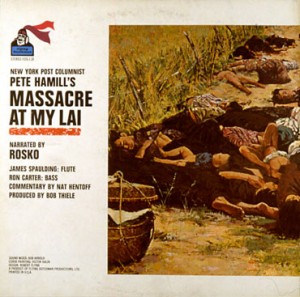
album: Massacre at My Lai (1970)
A spoken word release (Flying Dutchman # FDS-118) in which Rosko narrated the newspaper articles of Pete Hamill - an American journalist who in the 1960s wrote for the New York Post, reporting from Vietnam. (1) It took a highly critical view of the Vietnam War, the military, and the politicians of the era, such as President Eisenhower and President Nixon. Produced by Bob Thiele, founder of Flying Dutchman, it featured background music from Ron Carter (bass) and James Spaulding (flute). Nat Hentoff, music critic and historian, wrote the linear notes to the record. Hamill also wrote the words for the 1970 record Murder at Kent State University (Flying Dutchman # FDS-127).
Billboard noted the album on 28 February 1970, saying that "Bob Thiele's Flying Dutchman label again collaborated with WNEW-FM's Rosko...to spotlight writer Peter Hamill's description of... (continuer)
A spoken word release (Flying Dutchman # FDS-118) in which Rosko narrated the newspaper articles of Pete Hamill - an American journalist who in the 1960s wrote for the New York Post, reporting from Vietnam. (1) It took a highly critical view of the Vietnam War, the military, and the politicians of the era, such as President Eisenhower and President Nixon. Produced by Bob Thiele, founder of Flying Dutchman, it featured background music from Ron Carter (bass) and James Spaulding (flute). Nat Hentoff, music critic and historian, wrote the linear notes to the record. Hamill also wrote the words for the 1970 record Murder at Kent State University (Flying Dutchman # FDS-127).
Billboard noted the album on 28 February 1970, saying that "Bob Thiele's Flying Dutchman label again collaborated with WNEW-FM's Rosko...to spotlight writer Peter Hamill's description of... (continuer)
Poor, lost America, clean, honorable, decent, even naive
(continuer)
(continuer)
envoyé par dq82 26/3/2015 - 17:31
Parcours:
Guerre au Vietnam: vue des USA
Ballad of Song My
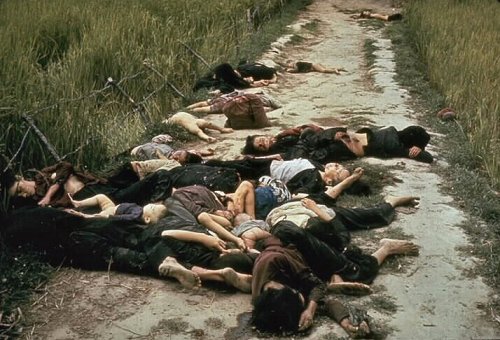
1970
testo e spartito
Il massacro di Mỹ Lai, conosciuto anche come massacro di Sơn Mỹ, fu un massacro di civili inermi che avvenne durante la guerra del Vietnam, quando i soldati statunitensi della Compagnia Charlie, della 11a Brigata di Fanteria Leggera, agli ordini del tenente William Calley, uccisero 347 civili - principalmente vecchi, donne, bambini e neonati.
Il massacro avvenne il 16 marzo 1968 a My Lai, una delle quattro frazioni raggruppate nei pressi del villaggio di Sơn Mỹ, nella provincia di Quang Ngai a circa 840 chilometri a nord di Saigon. I soldati si abbandonarono anche alla tortura e allo stupro degli abitanti. Come venne riferito da un tenente dell'esercito sudvietnamita ai suoi superiori, fu una atroce vendetta, che avvenne poco dopo uno scontro a fuoco con delle truppe Viet Cong che si erano mischiate ai paesani.
Il massacro fu fermato dall'equipaggio di un elicottero... (continuer)
testo e spartito
Il massacro di Mỹ Lai, conosciuto anche come massacro di Sơn Mỹ, fu un massacro di civili inermi che avvenne durante la guerra del Vietnam, quando i soldati statunitensi della Compagnia Charlie, della 11a Brigata di Fanteria Leggera, agli ordini del tenente William Calley, uccisero 347 civili - principalmente vecchi, donne, bambini e neonati.
Il massacro avvenne il 16 marzo 1968 a My Lai, una delle quattro frazioni raggruppate nei pressi del villaggio di Sơn Mỹ, nella provincia di Quang Ngai a circa 840 chilometri a nord di Saigon. I soldati si abbandonarono anche alla tortura e allo stupro degli abitanti. Come venne riferito da un tenente dell'esercito sudvietnamita ai suoi superiori, fu una atroce vendetta, che avvenne poco dopo uno scontro a fuoco con delle truppe Viet Cong che si erano mischiate ai paesani.
Il massacro fu fermato dall'equipaggio di un elicottero... (continuer)
Can you sing of Song My and can you tell me why
(continuer)
(continuer)
envoyé par dq82 26/3/2015 - 17:22
Parcours:
Guerre au Vietnam: vue des USA
Texas Tweezers
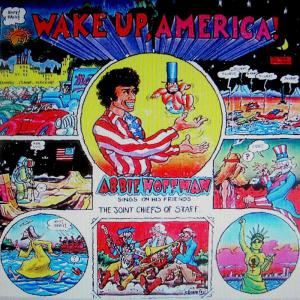
1970
Wake up America!
The album Wake Up, America (Big Toe Records # 1) contained several references to Vietnam, such as the tracks "Our National Anthem", "Chicago", and "The Drug Company". On the track "Texas Tweezers" Hoffman took a phone call on a radio show. The caller attacked Hoffman for being ignorant, an exhibitionist, and for criticising the country, which, according to the caller, would have got him killed in Russia. Hoffman responded by arguing that the US "killed a million people in Vietnam" which damaged her reputation. He then rhetorically ask the caller "what do you think My Lai was, a god damn Connie Island trip".
Wake up America!
The album Wake Up, America (Big Toe Records # 1) contained several references to Vietnam, such as the tracks "Our National Anthem", "Chicago", and "The Drug Company". On the track "Texas Tweezers" Hoffman took a phone call on a radio show. The caller attacked Hoffman for being ignorant, an exhibitionist, and for criticising the country, which, according to the caller, would have got him killed in Russia. Hoffman responded by arguing that the US "killed a million people in Vietnam" which damaged her reputation. He then rhetorically ask the caller "what do you think My Lai was, a god damn Connie Island trip".
Caller:
(continuer)
(continuer)
envoyé par dq82 26/3/2015 - 17:07
Parcours:
Guerre au Vietnam: vue des USA
Crudo

Chanson italienne – Crudo – Susanna Parigi – 2011
Album: "La lingua segreta delle donne" (2011)
Album: "La lingua segreta delle donne" (2011)
RUDE
(continuer)
(continuer)
envoyé par Marco Valdo M.I. 26/3/2015 - 16:35
Thyssen, opera sonora
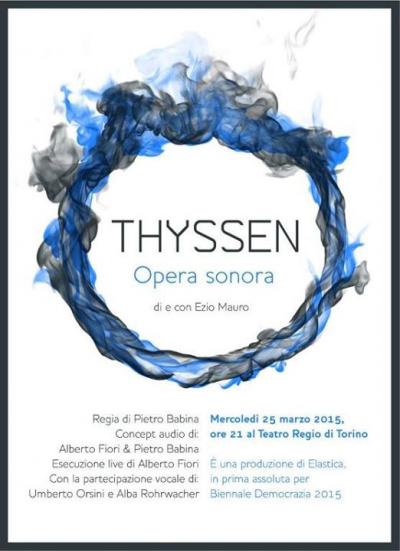
[2015]
di e con Ezio Mauro
regia di Pietro Babina
concept audio di Alberto Fiori & Pietro Babina
esecuzione live di Alberto Fiori
voci di Umberto Orsini e Alba Rohrwacher
Produzione Elastica srl
Ieri sera qui a Torino è stata inaugurata quarta edizione di Biennale Democrazia, una manifestazione culturale il cui “obiettivo è la diffusione di una cultura della democrazia che sappia tradursi in pratica democratica.”
Checché se ne possa dire (borghesi, buuu!, cattocomunisti, buuu!, le lezioni magistrali di Draghi e della Boldrini, buuu!... ) di questo progetto ideato da Gustavo Zagrebelsky – ex membro e presidente della Corte Costituzionale, nonché mio quasi compaesano ed il migliore docente che io abbia mai avuto – checchè se ne possa dire del Repubblicano Ezio Mauro e del suo giornale “di regime”, beh, questa è un’opera in memoria di
Antonio Schiavone
Giuseppe Demasi
Angelo... (continuer)
di e con Ezio Mauro
regia di Pietro Babina
concept audio di Alberto Fiori & Pietro Babina
esecuzione live di Alberto Fiori
voci di Umberto Orsini e Alba Rohrwacher
Produzione Elastica srl
Ieri sera qui a Torino è stata inaugurata quarta edizione di Biennale Democrazia, una manifestazione culturale il cui “obiettivo è la diffusione di una cultura della democrazia che sappia tradursi in pratica democratica.”
Checché se ne possa dire (borghesi, buuu!, cattocomunisti, buuu!, le lezioni magistrali di Draghi e della Boldrini, buuu!... ) di questo progetto ideato da Gustavo Zagrebelsky – ex membro e presidente della Corte Costituzionale, nonché mio quasi compaesano ed il migliore docente che io abbia mai avuto – checchè se ne possa dire del Repubblicano Ezio Mauro e del suo giornale “di regime”, beh, questa è un’opera in memoria di
Antonio Schiavone
Giuseppe Demasi
Angelo... (continuer)
Gli operai di Torino diventati invisibili
(continuer)
(continuer)
envoyé par Bernart Bartleby 26/3/2015 - 14:02
La risposta al ragazzo della via Gluck

[1966]
Testo di Giorgio Gaber
Musica: Giorgio Gaber
Originariamente in singolo
Poi in: Collezione singoli 1965/67
Il ragazzo della via Gluck riesce a farsi accettare se cantata da Adriano, che la impone con la sua personalità di interprete, ma come canzone non esiste: è ingenua, superficiale, sembra un tema fatto da un bambino di seconda elementare. Dov'è la protesta in quel "chissà dove si va a finire"?
Non si riesce mai a capire se Adriano scherza o fa sul serio.
Giorgio Gaber
Testo di Giorgio Gaber
Musica: Giorgio Gaber
Originariamente in singolo
Poi in: Collezione singoli 1965/67
Il ragazzo della via Gluck riesce a farsi accettare se cantata da Adriano, che la impone con la sua personalità di interprete, ma come canzone non esiste: è ingenua, superficiale, sembra un tema fatto da un bambino di seconda elementare. Dov'è la protesta in quel "chissà dove si va a finire"?
Non si riesce mai a capire se Adriano scherza o fa sul serio.
Giorgio Gaber
Questa è la storia di un ragazzo
(continuer)
(continuer)
envoyé par Riccardo Venturi 26/3/2015 - 12:23
Un albero di trenta piani
[1972]
Parole e musica di Adriano Celentano
Nel disco “I mali del secolo”
Celentano prosegue qui sulla “linea verde” inaugurata alcuni anni prima con “Il ragazzo della via Gluck” (così celebre ed amata da venir ancora recentemente coverizzata dal nostro Venturik, che ha spostato il brano decisamente sulla “linea rossa” )
Non so nulla di ingegneria civile e ignoro se i moderni grattacieli – che anche qui a Torino hanno ormai per sempre modificato l’antica skyline – siano davvero “ecosostenibili”, ad “emissioni zero” e risparmiosi come ci vogliono far credere. A me piacciono, come idea estetica, però credo che siano dei succhiaenergia e che pongano pure grossi problemi di sicurezza. Penso comunque che non mi piacerebbe vivere o lavorare in un formicaio, termitaio od alveare che sia: sono un essere umano, non un insetto che vive in colonia.
E poi mi rode abbastanza il culo al pensiero che ciò che svetta qui è il cazzone in vetro, acciaio e cemento di uno dei peggiori usurai d’Italia, l’Intesa Sanpaolo…
Parole e musica di Adriano Celentano
Nel disco “I mali del secolo”
Celentano prosegue qui sulla “linea verde” inaugurata alcuni anni prima con “Il ragazzo della via Gluck” (così celebre ed amata da venir ancora recentemente coverizzata dal nostro Venturik, che ha spostato il brano decisamente sulla “linea rossa” )
Non so nulla di ingegneria civile e ignoro se i moderni grattacieli – che anche qui a Torino hanno ormai per sempre modificato l’antica skyline – siano davvero “ecosostenibili”, ad “emissioni zero” e risparmiosi come ci vogliono far credere. A me piacciono, come idea estetica, però credo che siano dei succhiaenergia e che pongano pure grossi problemi di sicurezza. Penso comunque che non mi piacerebbe vivere o lavorare in un formicaio, termitaio od alveare che sia: sono un essere umano, non un insetto che vive in colonia.
E poi mi rode abbastanza il culo al pensiero che ciò che svetta qui è il cazzone in vetro, acciaio e cemento di uno dei peggiori usurai d’Italia, l’Intesa Sanpaolo…
Per la tua mania
(continuer)
(continuer)
envoyé par Bernart Bartleby 26/3/2015 - 10:36
Parcours:
Guerre à la Terre
Hobo's Lullaby
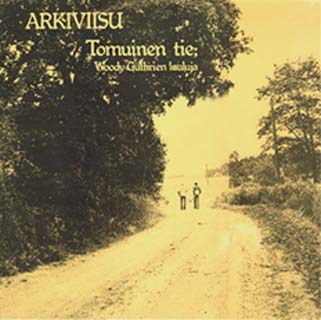
Finnis translation by Mikko Perkoila and Hannu Raatikainen
Suomennos Mikko Perkoila ja Hannu Raatikainen
This song was made by a Finnish band called Arkiviisu and it's included on their 1977 record »Tomuinen tie« (Dusty Road or Goin' Down the Road Feelin' Bad) by Love Records. I haven't been able to find in posted on the Web, but maybe somebody will.
Suomennos Mikko Perkoila ja Hannu Raatikainen
This song was made by a Finnish band called Arkiviisu and it's included on their 1977 record »Tomuinen tie« (Dusty Road or Goin' Down the Road Feelin' Bad) by Love Records. I haven't been able to find in posted on the Web, but maybe somebody will.
KULKURIN KEHTOLAULU
(continuer)
(continuer)
envoyé par Juha Rämö 26/3/2015 - 08:55
Il ragazzo della via Rock
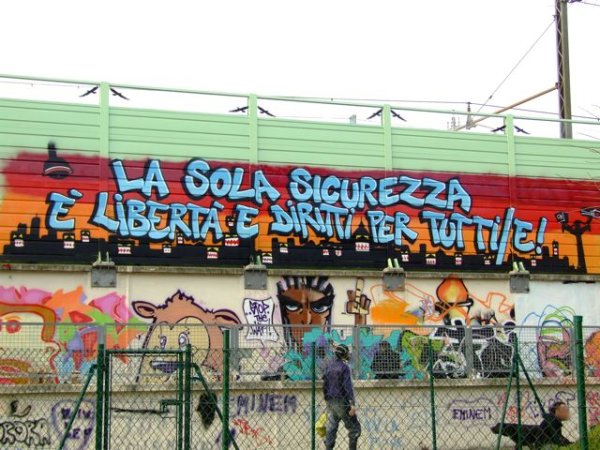
[26 marzo 2015]
Scritta da Riccardo Venturi
Sull'aria de Il ragazzo della via Gluck di Celentano
Non c'è alcun dubbio che Il ragazzo della via Gluck, che ha trovato il suo spazio nelle CCG, sia una canzone che, a modo suo, parla di proletariato urbano e di immigrazione. E' la Milano degli anni '50 quella che si ha davanti agli occhi in quella canzone di un figlio di immigrati meridionali (“Celentano” non è senz'altro un cognome puro meneghino). Ora però vorrei presentarvi un bel quartierino di Firenze, che esiste ancora e che si formò, giustappunto, negli anni '50: le Case Minime di Rovezzano. Intanto ve lo presento con un bel rap:
Ne sono, casualmente, appena tornato. Perché, a differenza della via Gluck milanese che sembra essere diventata una strada quasi fighetta ed è ormai inglobata nella città, le Case Minime, in quest'anno di grazia 2015, sono rimaste tutt'altro che fighette.... (continuer)
Scritta da Riccardo Venturi
Sull'aria de Il ragazzo della via Gluck di Celentano
Non c'è alcun dubbio che Il ragazzo della via Gluck, che ha trovato il suo spazio nelle CCG, sia una canzone che, a modo suo, parla di proletariato urbano e di immigrazione. E' la Milano degli anni '50 quella che si ha davanti agli occhi in quella canzone di un figlio di immigrati meridionali (“Celentano” non è senz'altro un cognome puro meneghino). Ora però vorrei presentarvi un bel quartierino di Firenze, che esiste ancora e che si formò, giustappunto, negli anni '50: le Case Minime di Rovezzano. Intanto ve lo presento con un bel rap:
Ne sono, casualmente, appena tornato. Perché, a differenza della via Gluck milanese che sembra essere diventata una strada quasi fighetta ed è ormai inglobata nella città, le Case Minime, in quest'anno di grazia 2015, sono rimaste tutt'altro che fighette.... (continuer)
Questa è la storia
(continuer)
(continuer)
26/3/2015 - 01:23
Venivamo tutte dal mare

Chanson italienne – Venivamo tutte dal mare – Susanna Parigi – 2014
NOUS VENIONS TOUTES DE LA MER
(continuer)
(continuer)
envoyé par Marco Valdo M.I. 25/3/2015 - 21:02
El alma llena de banderas

Finnish translation by Pentti Saaritsa
Suomennos Pentti Saaritsa
A link link to this beautiful song performed by Agit Prop (from their 1974 record »Laulu kaikille«):
Suomennos Pentti Saaritsa
A link link to this beautiful song performed by Agit Prop (from their 1974 record »Laulu kaikille«):
SYDÄMESTÄ HULMAHTAVAT LIPUT
(continuer)
(continuer)
envoyé par Juha Rämö 25/3/2015 - 18:39
Fiume Sand Creek

CATALANO / CATALAN - Riccardo Venturi
Adaptament al català de Riccardo Venturi
25 de març de 2015
Adattamento in catalano di Riccardo Venturi
25 marzo 2015
25 de març de 2015
Adattamento in catalano di Riccardo Venturi
25 marzo 2015
RIU SAND CREEK
(continuer)
(continuer)
25/3/2015 - 16:01
Divide et Impera!

2015
Oh!
con la partecipazione del rapper sardo
En?gma
Oh!
con la partecipazione del rapper sardo
En?gma
Sei sulla poltrona là sfatto
(continuer)
(continuer)
envoyé par dq82 25/3/2015 - 15:10
1989

2015
"9"
Scritto nel 1989 e rimasto chiuso in un cassetto fino ad oggi, il brano sintetizza l'atmosfera che si respirava in quel periodo denso di avvenimenti storici: la protesta di piazza Tienanmen, la vittoria del sindacato "Solidarnosc" alle elezioni in Polonia, il crollo del Muro di Berlino.
rockol.it
"9"
Scritto nel 1989 e rimasto chiuso in un cassetto fino ad oggi, il brano sintetizza l'atmosfera che si respirava in quel periodo denso di avvenimenti storici: la protesta di piazza Tienanmen, la vittoria del sindacato "Solidarnosc" alle elezioni in Polonia, il crollo del Muro di Berlino.
rockol.it
Persi nella nuvola blu
(continuer)
(continuer)
envoyé par DoNQuijote82 25/3/2015 - 14:54
The Soldier’s Wife
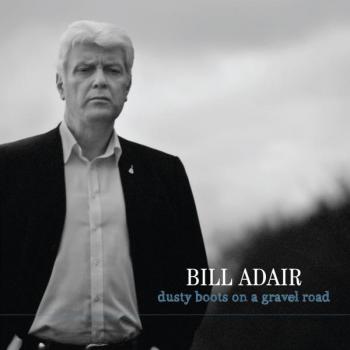
Through all the years that he’s away,
(continuer)
(continuer)
envoyé par Bernart Bartleby 25/3/2015 - 14:26
Dead Soldiers’ Wives Don’t Dance
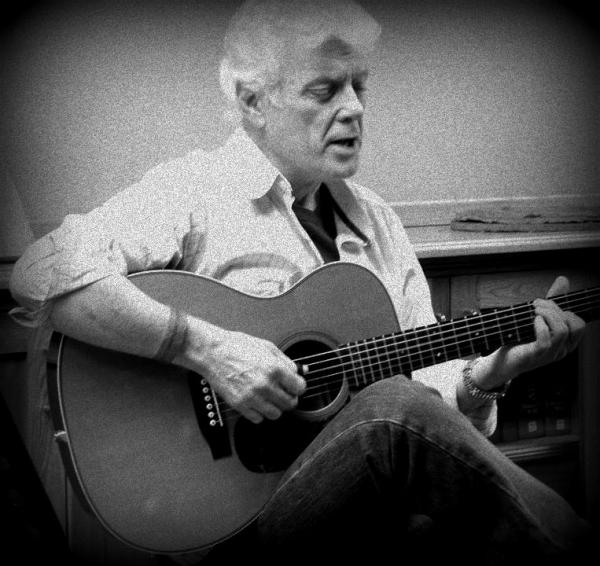
[2011]
Parole e musica di W. J. “Bill” Adair, singer songwriter di Glasgow.
Parole e musica di W. J. “Bill” Adair, singer songwriter di Glasgow.
See them marching to the railway in their uniforms and boots,
(continuer)
(continuer)
envoyé par Bernart Bartleby 25/3/2015 - 14:16
Parcours:
La Grande Guerre (1914-1918)
Addio Juna

mi scusi sig.ra Elda....
avrei una curiosità da chiederle....
io mi chiamo Juna, ho 42 anni...
mia madre mi ha dato questo nome preso proprio dalla canzone....
ma non sono mai riuscita a sapere da dove viene questo nome e che cosa significa.....
lei saprebbe mica aiutarmi????
grazie....
avrei una curiosità da chiederle....
io mi chiamo Juna, ho 42 anni...
mia madre mi ha dato questo nome preso proprio dalla canzone....
ma non sono mai riuscita a sapere da dove viene questo nome e che cosa significa.....
lei saprebbe mica aiutarmi????
grazie....
juna.telesca@gmail.com 25/3/2015 - 14:08
Union Maid
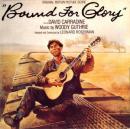
Finnis translation by Mikko Perkoila and Hannu Raatikainen
Suomennos Mikko Perkoila ja Hannu Raatikainen
Suomennos Mikko Perkoila ja Hannu Raatikainen
LIITON TYTTÖ
(continuer)
(continuer)
envoyé par Juha Rämö 25/3/2015 - 11:04
Peace and Love

(1990)
Album: "Now"
Album: "Now"
Oh as I sit under this weeping willow tree
(continuer)
(continuer)
envoyé par dq82 25/3/2015 - 10:23
Fragen eines lesenden Arbeiters
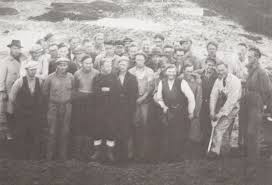
Þýtt hefur Eysteinn Þorvaldsson
SPURNINGAR LESANDI VERKAMANNS
(continuer)
(continuer)
envoyé par Rikarður V. Albertsson 24/3/2015 - 23:32
Fragen eines lesenden Arbeiters
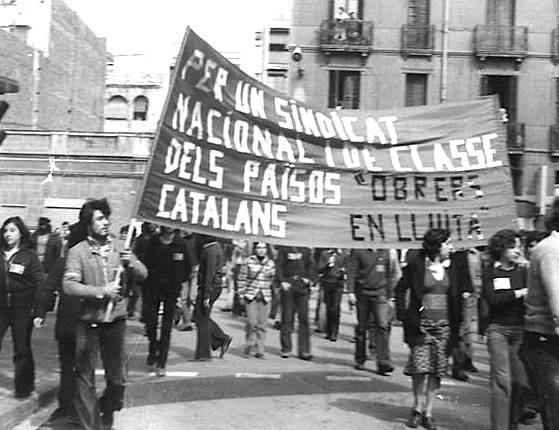
Traducció al català per Poesia de Butxaca
PREGUNTES D'UN OBRER DEVANT UN LLIBRE
(continuer)
(continuer)
envoyé par Herr Puntila und sein Knecht Matti 24/3/2015 - 23:20
Fragen eines lesenden Arbeiters

Mikel Laboaren euskal itzulpena (1969)
La versione finlandese di Brita Polttila proposta da Juha Rämö, che è praticamente alla base di questa pagina, non è l'unica musicata e cantata: la versione in lingua basca di Mikel Laboa era già presente da tempo in questo sito.. La versione di Mikel Laboa, del 1969, si trova del resto in un album interamente dedicato a canzoni brechtiane tradotte in euskara. [RV]
The Finnish version by Brita Polttila contributed by Juha Rämö, which practically forms the basis of this page, is not the only that has been set to music and performed: the Basque version by Mikel Laboa had long since been included in this website. As a matter of fact, Mikel Laboa's version (1969) is included in an album wholly composed of Brechtian songs translated into Euskara. [RV]
La versione finlandese di Brita Polttila proposta da Juha Rämö, che è praticamente alla base di questa pagina, non è l'unica musicata e cantata: la versione in lingua basca di Mikel Laboa era già presente da tempo in questo sito.. La versione di Mikel Laboa, del 1969, si trova del resto in un album interamente dedicato a canzoni brechtiane tradotte in euskara. [RV]
The Finnish version by Brita Polttila contributed by Juha Rämö, which practically forms the basis of this page, is not the only that has been set to music and performed: the Basque version by Mikel Laboa had long since been included in this website. As a matter of fact, Mikel Laboa's version (1969) is included in an album wholly composed of Brechtian songs translated into Euskara. [RV]
LANGILE BATEN GALDERAK LIBURU BATEN AURREAN
(continuer)
(continuer)
envoyé par Herr Puntila und sein Knecht Matti 24/3/2015 - 22:55
Fragen eines lesenden Arbeiters
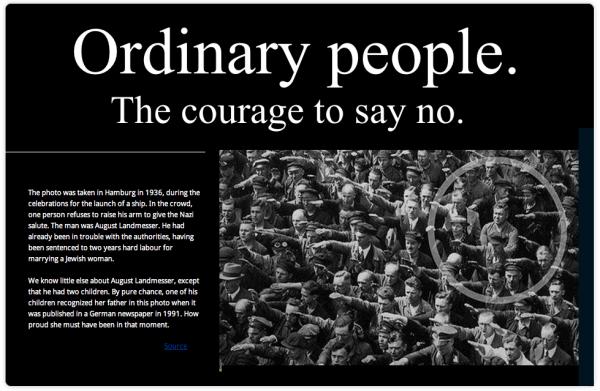
Svensk översättning av Erwin Leiser
EN LÄSANDE ARBETARES FRÅGOR
(continuer)
(continuer)
envoyé par Herr Puntila und sein Knecht Matti 24/3/2015 - 22:40
Mezzo pane e un libro
Antiwar Songs Blog

Non solo di pane vive l’uomo. Io, se avessi fame e fossi senza forze per la strada, non chiederei un pane; ma chiederei mezzo pane e un libro. Ed io attacco da qui violentemente quanti parlano soltanto di rivendicazioni economiche senza nominare mai le rivendicazioni culturali che è poi quel che richiedono gridando i cittadini. […]
Antiwar Songs Staff 2015-03-24 22:24:00
Corrandes d'exili

24 marzo 2014
(con la correzione di Ramon Mantovani)
1970: Pere Quart recita alcune strofe delle Corrandes d'exili al Festival della Letteratura Catalana, a Barcellona. Al termine il pubblico grida Llibertat! Llibertat!
(con la correzione di Ramon Mantovani)
1970: Pere Quart recita alcune strofe delle Corrandes d'exili al Festival della Letteratura Catalana, a Barcellona. Al termine il pubblico grida Llibertat! Llibertat!
STROFE D'ESILIO
(continuer)
(continuer)
24/3/2015 - 18:38
×
![]()

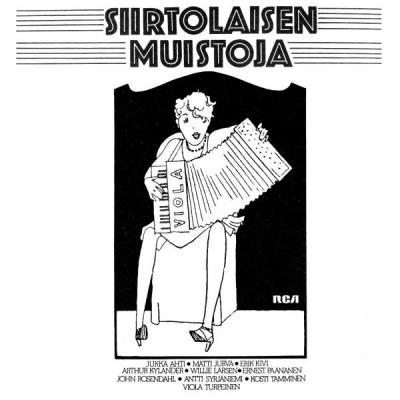
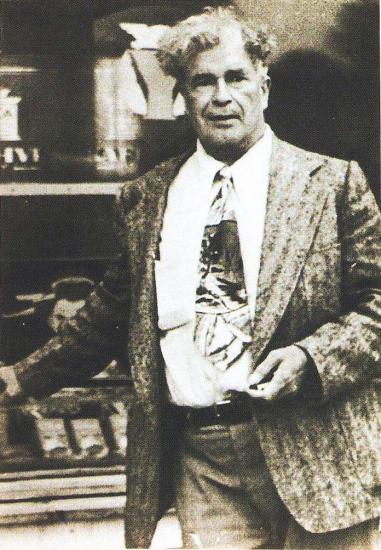
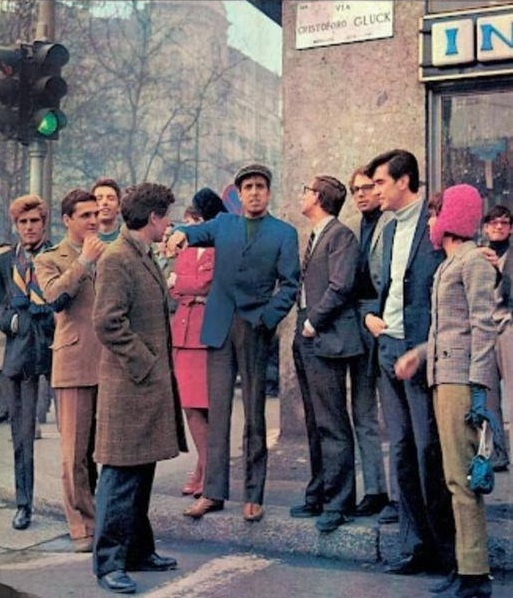
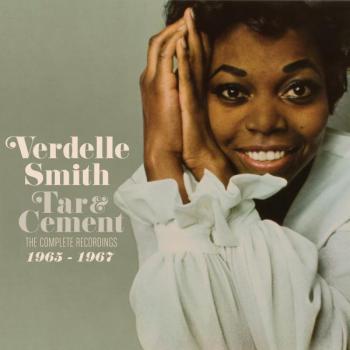

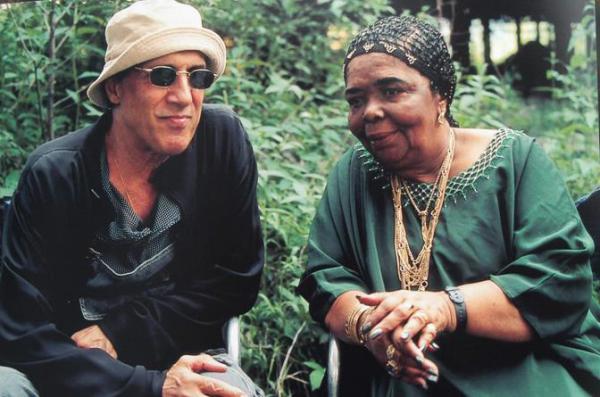
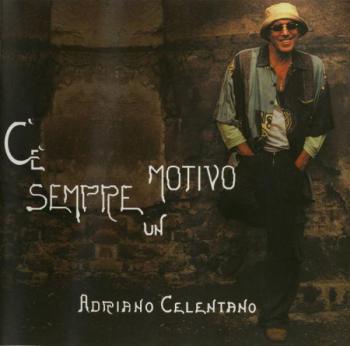



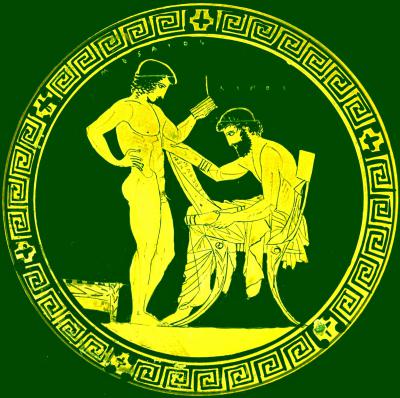

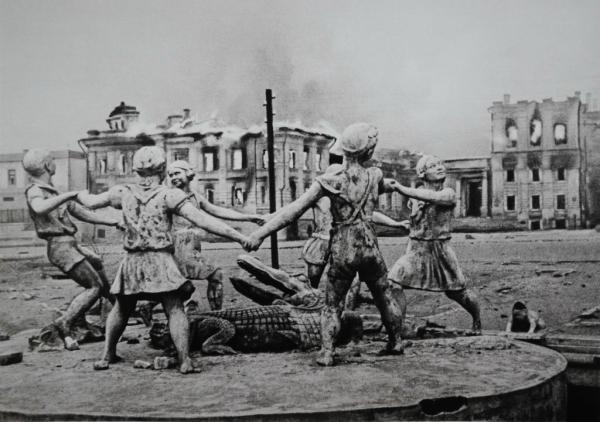

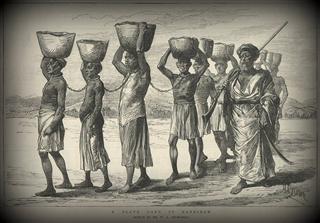


Testo e musica / Lyrics and music / Paroles et musique / Sanat ja sävel:
Hiski Salomaa (Hiskias Möttö, Kangasniemi 17-5-1891 – New York 7-7-1957)
[Recorded 20.3.1929]
Between 1927 and 1931 Hiski Salomaa, who had immigrated to the USA in 1909, recorded 18 Finnish songs for Columbia Records. One of these was »Vapauden kaiho« which was originally commissioned from him by his labor union, the radical IWW (Industrial Workers of the World). Apart from one, all these recordings are available here.
In terms of linguistics, Salomaa's songs are interesting in two ways: he sings in a broad east Finnish accent (Savonian dialect) and his lyrics often - not in this case, though - contain words that are called Finglish, a term originated by Martti Nisonen, professor at the Suomi College in Hancock, Michigan, in the 1920's and referring to a mixture of English and Finnish common among Finnish... (continuer)